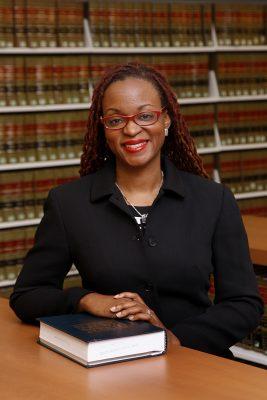By Ava Berger, Emily Pauls and Jasmine Grant
Black people are two times more likely to be killed by police than white people, according to Jamila Jefferson-Jones, professor of law at Wayne State University.

To discuss the phenomenon of Black people facing obstacles while driving, Angela Onwuachi-Willig, dean of BU School of Law, invited Jefferson-Jones to speak as part of the Congresswoman Barbara Jordan Speaker Series on Race, Law, & Inequality.
Jefferson-Jones’ research paper ““Driving While Black” as “Living While Black,”” published in the Iowa Law Review, connects the ideas of living and driving as a Black person through the lens of “structural spatial racism” — the concept that certain spaces, such as roads, are racialized by police violence, preventing Black people from utilizing the freedom of these spaces.
“I don’t see this as a small problem… because the risk is death,” Jefferson-Jones said. “It’s not just the financial risk of having to deal with fines and fees. It’s not even just the risk of incarceration, which is a big risk, it’s the risk of dying.”
Jefferson-Jones’ grandfather, Herman Green, Sr., who helped create the “Junior Deputies” — a group for black teenagers in deep-south Louisiana in the mid 1960’s — inspired her to conduct her research paper. In its heyday, the group traveled across the country to sites of Black historical and political importance, but the trips were regularly affected by Jim Crow laws.
“The open road of the American imagination was freeing for Black travelers but it was also treacherous,” Jefferson-Jones said. “These kids got to get out of the neighborhood but there was a lot to overcome by entering this … mythological open road.”
Jefferson-Jones said a racialized space accepts some and rejects others, which can lead to the concept of “racial territoriality” — a term coined by Elise Boddie, professor of Law at Rutgers University.
“The central principle of racial territoriality is that what should be a shared space is being wrongfully claimed in the nature of racist exclusion and in the interest of white supremacy,” Jefferson-Jones said.
The cause of racial territoriality is state-sanctioned police violence, often exercised through the form of pretextual traffic stops — stops unrelated to traffic violations — she said.
“The air freshener, the turn signal, the busted light, even the expired license plate, none of those are putting others at risk on the road,” Jefferson-Jones said.
In her paper, Jefferson-Jones cited a 2002 study which found that Black motorists were subject to license plate queries “over 300 percent more often” than non-Black drivers.
To decrease the risk of police brutality, she calls for an end to pretextual traffic stops since “there’s always that possibility of escalation” which is increased for “people of color” and traffic stops, in general, are the most likely “point of contact with police.”
“Traffic stops have been used to harass Black people, to police Black bodies and to circumscribe Black movement since the invention of the automobile and the rise of traffic enforcement,” Jefferson-Jones said.
A bill she mentioned, which is currently under consideration by the Oregon state legislature, would prevent minor-infraction traffic stops and provide an opportunity for drivers to object to unnecessary vehicle searches.
“[Over-policing] impacts freedom of movement, it impacts mobility, the ability to self actualize and to choose paths,” Jefferson-Jones said in an interview
BU law student, Mara Rosario, who attended the event, said attending events such as this one helps raise awareness on topics like “Driving While Black.”
“It’s important to be taught these things because it helps you understand and understanding is the only way you’re going to get any change,” Rosario said.
Onwuachi-Willig brought the conversation to BU to highlight how “racialization shapes many aspects of people’s lives.”
“It is important for people to understand the constraints on the movement of Black people on the ‘open road,’ which is not so open for Black people in what many consider to be simple, normal everyday spaces,” Onwuachi-Willig said.
The BU School of Law dean said the event was a “success” because Jefferson-Jones was an “effective storyteller.”
“There are all sorts of ways in which life is made, either more inconvenient, more deadly, more expensive, in some ways for people of color,” Jefferson-Jones said.


























































































































